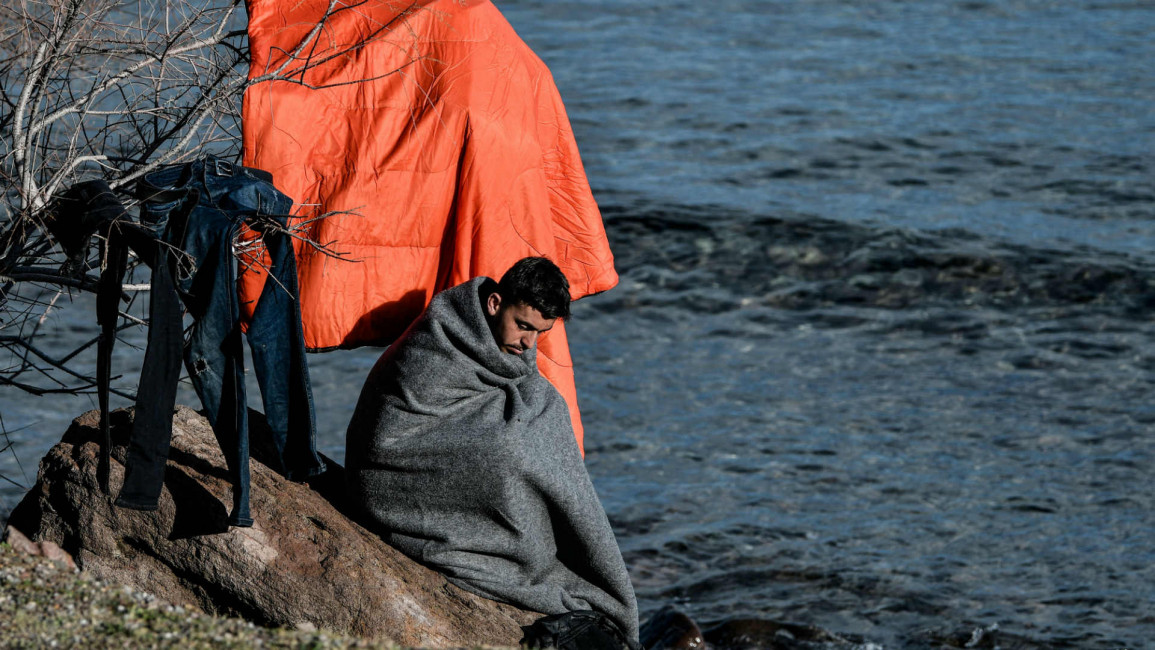Turkey's Erdogan orders coastguard to stop refugees making risky Aegean crossing to Greece
Thousands of migrants have massed on the land border with Greece after Erdogan said last week that Turkey would not prevent migrants from leaving for EU territory, sparking violence and an escalating row between Ankara and Brussels.
The Turkish coastguard tweeted on Friday that "on the orders of the president... permission will not be given for migrants to cross the Aegean sea because it is dangerous".
Winter temperatures make the crossing even more risky than it is in summer months.
The coastguard added that Turkey's policy of allowing migrants and refugees to leave was untouched, and the instruction only affected sea crossings.
Turkey and the European Union have traded accusations, with Ankara telling Brussels to implement a 2016 migration deal, and the bloc claiming Ankara was using the migrants as political pawns.
During a tense hours-long stand-off on Saturday, Greek police used tear gas and water cannons on reugees and migrnts trying to break through fences in the border province of Edirne, according to AFP journalists at the scene.
The migrants responded by throwing stones and also shouted "open the gates".
|
|
Turkish security forces also responded by using tear gas.
Many refugees have been stranded in biting cold for days at the Pazarkule border, known as Kastanies on the Greek side.
Greece and Turkey trade accusations
The Turkish coastguard said 97 migrants were rescued on Thursday after "the Greek side flattened three boats and left them in a half-sinking state in the middle of the [Aegean] sea".
Earlier this week, the Turkish government released footage it said showed the Greek coastguard attacking a flimsy dinghy carrying migrants across the sea in an example of a "push-back" illegal under EU law.
Greek authorities deny using force or acting illegally.
"We have not used any sort of excessive force and we're always reacting, we're never initiating, in terms of responding to the provocations that have taken place on the border," Greek Prime Minister Kyriakos Mitsotakis told CNN.
He also accused Ankara of helping people, both at land and at sea, to cross into Greece.
Erdogan's communications director Fahrettin Altun said Turkey "categorically" rejected Mitsotakis' claims.
'Double standards'
As part of the 2016 agreement, Turkey agreed to stop the flow of migrants to Europe in exchange for billions of euros, but Ankara has repeateldy accused the European Union of failing to fulfil its pledges.
Altun listed how the bloc had failed to keep its promises, including resettling refugees currently in Turkey.
"As a result, Turkey had to divert its resources away from stopping the refugee flow to Europe and instead prepare for a potential influx from Idlib" the last major rebel-held bastion in in Syria, Altun said.
The Turkish foreign ministry meanwhile accused the EU of double standards.
"It is unfortunate... that the EU is acting in contradiction with its own principles and values by backing Greece, which is violating international law and human rights," it said.
On Friday, the EU said it rejected Turkey's "use of migratory pressure for political purposes".
Erdogan is to visit Brussels on Monday next week, his office said on Saturday.
While the presidency did not state why the Turkish president would be in Belgium, it is expected that he will meet with EU leaders to discuss the ongoing crisis.
Greece to build new refugee camps
|
|
Greece plans to build two new temporary camps to house hundreds of additional asylum seekers, the migration minister said Saturday.
"We want to build two closed centres in [the northern region of] Serres and the greater Athens area with 1,000 places," migration minister Notis Mitarachi told Skai TV.
"We need the backing of local communities. We cannot leave all [these] people on the islands," he said.
Mitarachi said the camps would host asylum seekers who arrived after March 1.
Residents of a Serres town rumoured to host one of the camps staged protests earlier this week and local officials declared their opposition to the plan.
Over 1,700 migrants have landed on Lesbos and four other Aegean islands from Turkey over the past week, adding to the 38,000 already crammed into abysmal and overstretched refugee centres.
The new surge has ramped up already high tensions on an island that has been on the migration frontline for years.
Frustration exploded into violence last weekend with mobs setting up roadblocks, attacking cars carrying NGO workers and beating journalists.
Follow us on Facebook, Twitter and Instagram to stay connected



